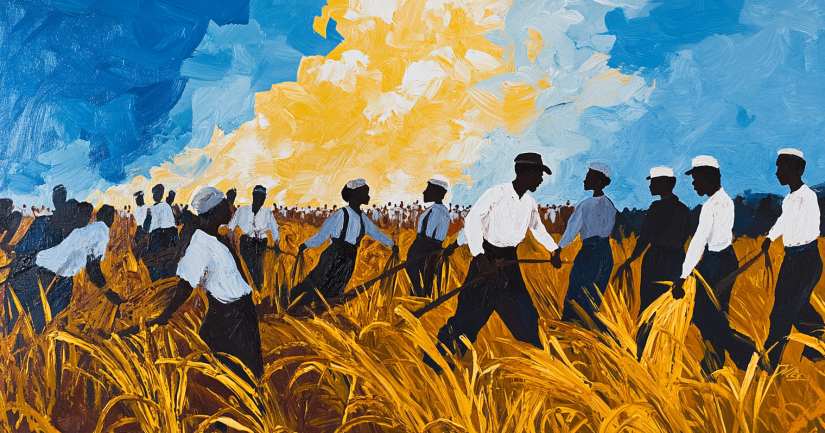
Explore the foundations of Douglass’s strength in Narrative Of The Life Of Frederick Douglass Chapter 03 Quiz – Test Your Knowledge of Power and Oppression. The Narrative Of The Life Of Frederick Douglass Chapter 03 Quiz challenges your understanding of the themes of power, deception, and cruelty in this chapter. Douglass continues to expose the harsh realities of slavery, describing the wealth and control of Colonel Edward Lloyd, the suffering of enslaved people, and the psychological tactics used to maintain oppression.
Douglass describes Colonel Edward Lloyd’s massive plantation, which functioned like a self-contained kingdom. With hundreds of enslaved workers and luxurious living conditions, Lloyd symbolized the unchecked power of slaveholders. Those who disobeyed faced severe punishment, reinforcing the stark contrast between wealth and suffering.
Douglass’s life is full of defining moments—make sure you’re keeping track by moving forward to the Narrative Of The Life Of Frederick Douglass Chapter 4 Quiz. If you need to revisit earlier events, refresh your memory with the Narrative Of The Life Of Frederick Douglass Chapter 2 Quiz. And for the ultimate test of your knowledge, take on the Narrative of the Life of Frederick Douglass Full Book Quiz.
Face the Narrative Of The Life Of Frederick Douglass Chapter 03 Quiz Challenge
Colonel Edward Lloyd’s Wealth and Control
The Brutality of Slavery on the Plantation
Enslaved people on Lloyd’s plantation lived in constant fear. Overseers, such as Mr. Gore, ruled with extreme cruelty, punishing enslaved workers without reason. Instead of facing consequences, Mr. Gore justified the killing, proving how the law protected slaveholders while denying justice to the enslaved.
Deception and Psychological Control
Slaveholders maintained power not only through violence but also through deception. Douglass explains how enslaved individuals were afraid to speak the truth about their suffering. Colonel Lloyd would sometimes disguise himself and question enslaved people about their treatment. This manipulation reinforced control, making resistance even more difficult.
Why This Chapter Matters
Chapter 3 of Narrative of the Life of Frederick Douglass highlights the cruelty, power, and psychological oppression that sustained slavery. Douglass’s descriptions expose the inhumanity of the system and reveal how fear was used to maintain order. His insights into deception and brutality deepen our understanding of the suffering endured by enslaved individuals.
Taking the Narrative Of The Life Of Frederick Douglass Chapter 03 Quiz will test your knowledge of these key themes. Engage with Douglass’s account, reflect on the realities of slavery, and gain a deeper appreciation for his journey toward freedom.
Test your knowledge with: Narrative of the Life of Frederick Douglass Quizzes!
What Happened – Narrative Of The Life Of Frederick Douglass Chapter 3
In Chapter 3 of Narrative of the Life of Frederick Douglass, Frederick Douglass describes life on Colonel Lloyd’s plantation. Colonel Lloyd owns a large estate with many slaves. The slaves work hard in the fields and are often punished. Lloyd’s plantation is very big, and he has several overseers to manage the slaves.
Colonel Lloyd is very wealthy. He owns many horses and carriages. He is very proud of his horses and wants them well taken care of. The overseer, Mr. Gore, is very strict and harsh. He often punishes slaves severely, sometimes without reason.
The slaves are given very little food. They receive a monthly allowance of food and clothes. The food is often not enough, and the clothes are poor quality. Slaves are not allowed to complain. If they do, they are punished.
Douglass mentions that Colonel Lloyd has a large garden. The garden is full of fruit, and slaves are not allowed to eat from it. To prevent theft, Lloyd puts tar on the fence. If a slave has tar on them, it means they tried to steal from the garden.
Douglass notes that slaves often argue about whose master is richer or kinder. However, they are careful not to speak badly about their masters.
Narrative Of The Life Of Frederick Douglass Chapter 3 – Quotes
“Mr. Hopkins was deemed a good overseer.” – {Frederick Douglass}, ‘Describing how the slaves perceived Mr. Hopkins as less cruel compared to other overseers.’
“Singing…is a testimony against slavery, and a prayer to God for deliverance from chains.” – {Frederick Douglass}, ‘Reflecting on how the songs of slaves were expressions of sorrow and a desire for freedom.’
“To describe the wealth of Colonel Lloyd would be almost equal to describing the riches of Job.” – {Frederick Douglass}, ‘Comparing Colonel Lloyd’s wealth to that of the biblical figure, emphasizing the vastness of his resources and power.’
Narrative Of The Life Of Frederick Douglass Chapter 3 – FAQ
Chapter 3 primarily delves into Douglass’s observations and experiences on the plantation of Colonel Lloyd. It explores the harsh realities of slave life, including the oppressive conditions and the deep-seated fear among slaves of speaking truthfully about their masters.
Douglass describes the relationship as one marked by fear and deception. Slaves were wary of speaking ill about Colonel Lloyd, as doing so could result in severe punishment.
The garden anecdote serves to illustrate the lengths to which Colonel Lloyd would go to maintain control and prevent theft. The garden, filled with tempting fruit, was a setting for numerous punishments, as Lloyd used tar to catch slaves attempting to steal. This story highlights the oppressive and controlling nature of the slave system.
Douglass underscores this ignorance to highlight the dehumanizing aspect of slavery. By denying slaves basic knowledge about themselves, slaveholders stripped them of their identity and autonomy, reducing them to mere property.
Douglass employs vivid imagery and detailed descriptions to convey the brutality and injustice of slavery. His language paints a stark picture of the cruelty slaves endured, from physical punishments to psychological manipulation, effectively evoking empathy and outrage in the reader.
